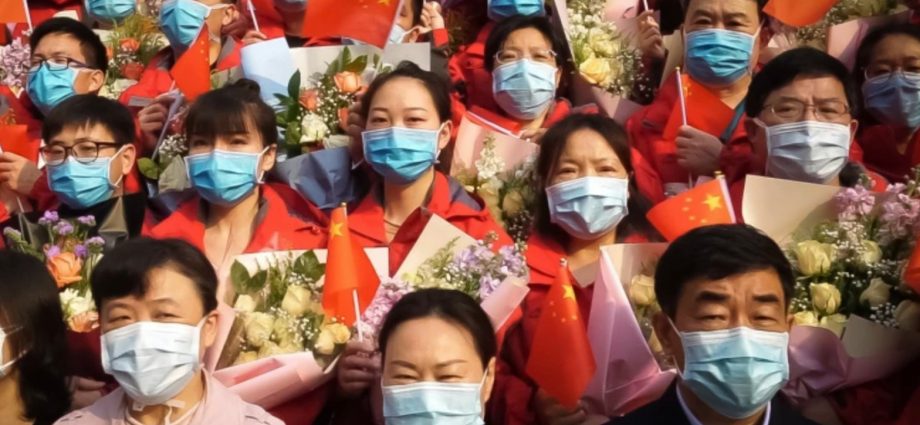
Once again Covid and China’s policy for combating it are causing a lot of excitement.
Hong Kong stock markets were up on Tuesday after an unconfirmed social media post said China was preparing to “reopen its border” in March next year.
The Hang Seng Index jumped 5.23% to 15,455 points. Tencent surged 10.6% while Meituan grew 11.9%. Meanwhile, the consumer staples sub-index of the CSI 300 was up 7% overnight, a move of four standard deviations.
The movement came after Hong Hao, managing director and head of research at BOCOM International, tweeted on Tuesday that he heard that Beijing had already formed a reopening committee, led by Wang Huning, a politburo standing committee member of the Chinese Communist Party.
Hong said the committee was reviewing Covid data from Hong Kong, Singapore and the United States, targeting the coming March for border reopening, which refers to the resumption of quarantine-free travel.
Also, the presence of BioNTech, which invented mRNA Covid vaccine, in a German delegation led by Chancellor Olaf Scholz visiting Beijing this Friday opened the possibility of Chinese collaboration with the company.
Early last month, some pro-Beijing Hong Kong politicians had expected that the central government would ease its anti-epidemic rule after the CCP’s one-week-long national congress ended on October 22. They expected the seven-day hotel quarantine requirements for international travelers would be reduced to three or four days.
However, so far there have not been any signs of such an announcement. On the contrary, state media called for maintaining strict Covid rules as the number of positives has gone up recently.
On Sunday, China reported 2,675 new Covid cases, up 802 from Saturday, the biggest daily increase since August 10. On Monday, the daily infection number grew to 2,719, which included 498 patients and 2,221 asymptomatic cases.
Adding drama to the statistics: Over the past weekend footage showing hundreds of workers fleeing from a Foxconn factory in Zhengzhou went viral over the Internet in China. The workers chose to spend 10 hours walking back home as they did not want to be affected by lockdown measures.
Wang Hai (pseudonym), a manager at a Foxconn-related production line in the industrial zone in Zhengzhou, told Yicai.com on Tuesday that some workers had left the factory as social media had misinformed them about the epidemic situation.
Wang said many workers felt panic after they were told that some of their peers with unclear Covid test results had been sent back to their posts and that those who were isolated did not have enough food.
He said those who were sent back to the factory were those who had were not infected themselves but had been in close contact with infected people, while food shortages only happened in some remote quarantine facilities.
However, he said it was very hard for him to explain to huge numbers of people about the situation. There were hundreds of thousands of workers in the industrial zone.
Wang said only about 50-60% of workers in his team were still on duty while the remaining went home or were under isolation.
On Sunday, Foxconn’s production lines, which make iPhones, doubled the daily bonuses from 50 yuan (US$6.89) to 100 yuan for the workers who could show up between October 26 and November 11.
On Tuesday, the Zhengzhou government announced that its lockdown measures had been eased to ensure the resumption of normal production. The city still reported 95 cases on Monday.
Langfang Daily, a Zhengzhou-based newspaper, said in its editorial that there were 267 million people aged above 60 in mainland China and some 50 million of them had not yet been fully vaccinated. It said the zero Covid policy had remained the best anti-epidemic strategy for the country.
In Guangdong province, a total of 479 cases were reported on Monday, compared with 757 cases on Sunday. The Guangzhou government launched a citywide Covid testing scheme on Monday, locked down several streets and encouraged people to stay home. In some districts, schools were closed while restaurants stopped providing dine-in services.
In Guangzhou, industrial zones started close-circuit management, meaning that workers have to stay overnight in factories.
Disneyland and Disneytown, Walt Disney Co’s Shanghai theme park and resort, were closed down suddenly on Monday after a few Covid cases were identified in the city. People were allowed to leave the park only if they tested negative.
The Shanghai government said on Tuesday the China International Import Expo, which will be held between November 5 and 10, will implement strict anti-epidemic rules, as anyone who had been to lockdown areas or had come from overseas in the past 10 days would not be allowed to enter the venue.
Some health experts have said it is unlikely that China will relax its anti-epidemic rules before its self-developed mRNA vaccine, namely AWcorna, can be widely used in the country. The vaccine is co-developed by Walvax Biotechnology Co, Suzhou Abogen Biosciences Co and the Chinese military.
Chang Junbiao, a chemical professor at the Henan Normal University, proposed another method for China to return to normal life.
Chang told Thepaper.cn in an interview that clinical trial results showed that Azvudine, an anti-HIV drug which is fully self-developed by China, could suppress the replication of the coronavirus and help mild and moderate Covid patients recover.
Shortly after the pandemic broke out in Wuhan in China in January 2020, international scientists started testing the use of AIDS drugs on Covid patients. Following the trend, China put Azvudine on its Covid medicine list in August this year.
Read: Hints of a shift in China’s ‘zero-Covid’ policy
Follow Jeff Pao on Twitter at @jeffpao3

